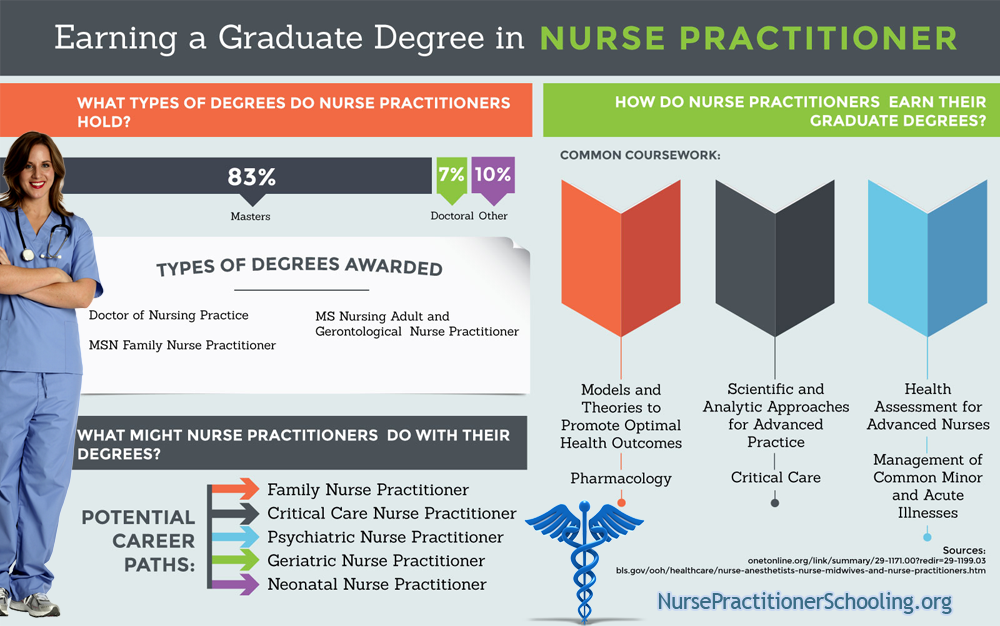Rating: 5. Reviewer: Nurse Practitioner Schooling - Item Reviewed: What Degree Do You Need To Be A Nurse Practitioner - Support by: Nurse Practitioner Schooling. Nurse Practitioner Schooling guide you to the best nurse practitioner schools in the united states to have at least a graduate degree in a designated specialty area of nursing.

The following steps will show you the Degree What You Need to Become a Nurse Practitioner:
- Master of Science in Nursing (MSN). It takes approximately three years to complete this course and concentrate on subjects, such as pathophysiology, health promotion, nursing theory, and pharmacology.
- Doctor of Nursing Practice (DNP). This is a Ph.D. Programs that require you to start work as a Nurse Practitioner. With a Ph.D., you can also become a nursing teacher. Some courses in this field such as leadership, population health, capstone projects and the complexity of behavior.
The nurse practitioner should be enrolled as a nurse with a bachelor's degree in nursing or related field from a certified college to apply. At the same time as their postgraduate studies, Nurse Practitioners take classes that concentrate on health care and disease avoidance. Nurse Practitioners also train to work in a distinctive specialization. Most postgraduate programs require candidates to have more than five years of medical engagement before applying for an education bill.
Do you have a little time to continue your studies? Are you confused about how to manage your time between work and study? Do not worry, with an online school program you can catch What Degree Do You Need To Be A Nurse Practitioner.
Today, many people are interested in learning online. This program allows you to study in the middle of your busy time, it means you can work in addition to your studies. Various online Nurse Practitioners programs are present. However, this course also involves some practical work. Some schools will require you to attend college every semester or more. Others will help you to organize practical experience in your own geographic area.
License and Certification:
Appropriate licenses and certifications for nurse practitioners depend on the country. All Nurse Practitioners must be licensed and certified through the state nursing board in consideration of practice. Some countries have collaborative agreements that determine the degree of independence of Nurse Practitioners and the main tasks.First, you must achieve your registered RN (registered nurse) license, known as NCLEX Registered Nurse, and then you should get your BSN. In the case of arrests specifically licensed as a Nurse Practitioner, the terms consider the circumstances in which you live. Each country has a Board of Nurses that will set requirements. Furthermore, you may also know here whether additional qualifications are required for a particular task, such as working independently or prescribing medicines.
Registered advanced nursing practitioners must have at least a master's degree and graduate achievement programs often involve courses in pharmacology and physiology, as well as courses for nursing specialties. There are many types of nurse practitioners, but in general there are four types of nurse practitioners:
* Clinical nurse specialist
* Anesthesiologist nurse
* Midwife nurse
* Nursing practitioners
There are also many different programs that are present to help Registered Nurses progress their education so they train one of these job scopes. As, a registered nurse who has a bachelor's degree can look for a master's program of science in nursing (MSN) or even get a BSN-to-DNP program, progress to a nursing practice level physician. Nurses with an associate degree can look for a similar program involving a Registered Nurse-to-BSN degree or a Registered Nurse-to-MSN degree. Education becomes very important in the world of advanced nursing. In this case, it has been suggested by the American Association of Colleges of Nursing (AACN) that incoming training for APRN is transferred to DPN by 2015.
Have you completed all the paths above? Have you reached the Degree of What the Nurse Practitioner Needs? Congratulations from.
Now, I will show you, some responsibility once you have earned and earned what degree you need to become a nursing practitioner.
Main Job Tasks:
- Defining treatment, in varying degrees
- Arrange direction
- Reach the patient's history, perform a physical exam, and order laboratory tests and procedures
- Diagnose, heat and manage disease
- Achieve certain mild procedures and operations, such as lumbar tissue or bone marrow biopsy
- Serving patient education and counseling to support healthy lifestyle behaviors
Nurse practitioners work in various settings and are repeatedly trained to practice in a special place. This may include:
* Family practice
* Geriatrics
* Cardiology
* Emergency
* Neonatology
* Primary care
* School health
* Oncology
* Pediatrics
* Women's health


0 Response to "What Degree Do You Need To Be A Nurse Practitioner"
Post a Comment